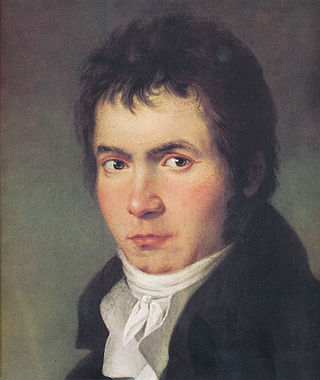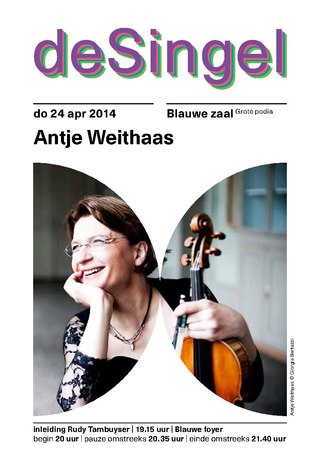
The Violin Concerto in D major, Op. 61, was written by Ludwig van Beethoven in 1806. Its first performance by Franz Clement was unsuccessful and for some decades the work languished in obscurity, until revived in 1844 by the then 12-year-old violinist Joseph Joachim with the orchestra of the London Philharmonic Society conducted by Felix Mendelssohn. Joachim would later claim it to be the "greatest" German violin concerto. Since then it has become one of the best-known and regularly performed violin concertos.

Anne-Sophie Mutter is a German violinist. Born and raised in Rheinfelden, Baden-Württemberg, Mutter started playing the violin at age five and continued studies in Germany and Switzerland. She was supported early in her career by Herbert von Karajan and made her orchestral debut with the Berlin Philharmonic in 1977. Since Mutter gained prominence in the 1970s and 1980s, she has recorded over 50 albums, mostly with the Deutsche Grammophon label, and performed as a soloist with leading orchestras worldwide and as a recitalist. Her primary instrument is the Lord Dunn–Raven Stradivarius violin.

Arabella Miho Steinbacher is a German classical violinist.
The Zurich Chamber Orchestra is a Swiss chamber orchestra based in Zurich. The ZKO's principal concert venue in Zurich is the Tonhalle. The ZKO also performs in Zurich at the Schauspielhaus Zürich, the ZKO-Haus in the Seefeld quarter of the city, and such churches as the Fraumünster and the Kirche St. Peter. The ZKO presents approximately 40 performances in Zurich each year, in addition to approximately 40 children's concerts and performances elsewhere in Switzerland and abroad. In the 2016–2017, season the total number of concerts was151, a record for the ZKO.

Rachel Barton Pine is an American violinist. She debuted with the Chicago Symphony at age 10, and was the first American and youngest ever gold medal winner of the International Johann Sebastian Bach Competition. The Washington Post wrote that she "displays a power and confidence that puts her in the top echelon."

Peter Watchorn is an Australian-born harpsichordist who has combined a virtuosic keyboard technique, musical scholarship and practical experience in the construction of harpsichords copied from original instruments of the 17th and 18th centuries. As well as presenting many solo public performances and broadcasts of baroque keyboard music and participating in choral and orchestral performances, he has made numerous commercial CD recordings of solo harpsichord music from the 17th and 18th centuries.

The Minuets in G major and G minor, BWV Anh. 114 and 115, are a pair of movements from a suite for harpsichord by Christian Petzold, which, through their appearance in the 1725 Notebook for Anna Magdalena Bach, used to be attributed to Johann Sebastian Bach. These minuets, which are suitable for beginners on the piano, are among the best known pieces of music literature. The 1965 pop song "A Lover's Concerto", of which millions of copies were sold, is based on the first of these Minuets.

Kinan Azmeh, is a Syrian clarinet player and composer of contemporary classical music based in New York City. Performing with orchestras such as the New York Philharmonic, the Seattle Symphony, the Bavarian Radio Symphony Orchestra, the West–Eastern Divan Orchestra, or the Syrian Symphony Orchestra, he has played as a soloist of classical works as well as of contemporary compositions.

Ray Chen is a Taiwanese-Australian violinist. He was the winner of the 2008 International Yehudi Menuhin Violin Competition and the 2009 Queen Elisabeth Competition. Since then, he has regularly collaborated with the world’s foremost orchestras and appeared at renowned concert halls.

Daniel Hope is a South African born classical violinist.

Mahan Esfahani is an Iranian-American harpsichordist.
The International Classical Music Awards (ICMA) are music awards first awarded 6 April 2011. ICMA replace the Cannes Classical Awards formerly awarded at MIDEM. The jury consists of music critics of magazines Andante, Crescendo, Fono Forum, Gramofon, Kultura, Musica, Musik & Theater, Opera, Pizzicato, Rondo Classic, Scherzo, with radio stations MDR Kultur (Germany), Orpheus Radio 99.2FM (Russia), Radio 100,7 (Luxembourg), the International Music and Media Centre (IMZ) (Austria), website Resmusica.com (France) and radio Classic (Finland).
Jan Vogler is a German-born classical cellist who lives in New York City.
Raminta Šerkšnytė is a Lithuanian composer, pianist and associate professor of composition. She is a laureate of the Lithuanian National Prize for Culture and Arts, in 2020 she was nominated (shortlisted) for a Gramophone Classical Music Award. Her De profundis for string orchestra (1998), composed when she was just twenty-two years of age, is one of the most popular and performed Lithuanian compositions across the world. Maestro Gidon Kremer described De profundis as “the calling card of Baltic music”.

Recomposed by Max Richter: Vivaldi – The Four Seasons is a composition by contemporary classical composer Max Richter. The piece is a complete recomposition and reinterpretation of Vivaldi's violin concertos The Four Seasons. Although Richter said that he had discarded 75 percent of Vivaldi's original material, the parts he does use are phased and looped, emphasising his grounding in postmodern and minimalist music.

Antje Weithaas is a German classical violinist. Apart from solo recitals and chamber music performances, she has played with leading orchestras in Europe, Asia and the United States.

Claude Mercier-Ythier was a French harpsichord maker who ran a shop and workshop in Paris dedicated exclusively to harpsichords. Instruments that he built and restored have been played in many concerts and recordings, including a recording of Bach's complete keyboard works by Zuzana Růžičková. He wrote a standard book on the topic, Les clavecins, published in 1990.
The Philharmonia Quartet Berlin is a string quartet founded in 1985 by members of the Berlin Philharmonic.
Arno Lücker is a German composer, musicologist, music critic and music dramaturge. He worked as a journalist in Berlin for press and radio, and as dramaturge at the Konzerthaus Berlin where he installed the series 2 x hören, presenting the same music twice. He has been lecturer of musicology at the University of Marburg, and journalist for Opernwelt, the leading trade journal for opera.
Marie Radauer-Plank is an Austrian violinist.













